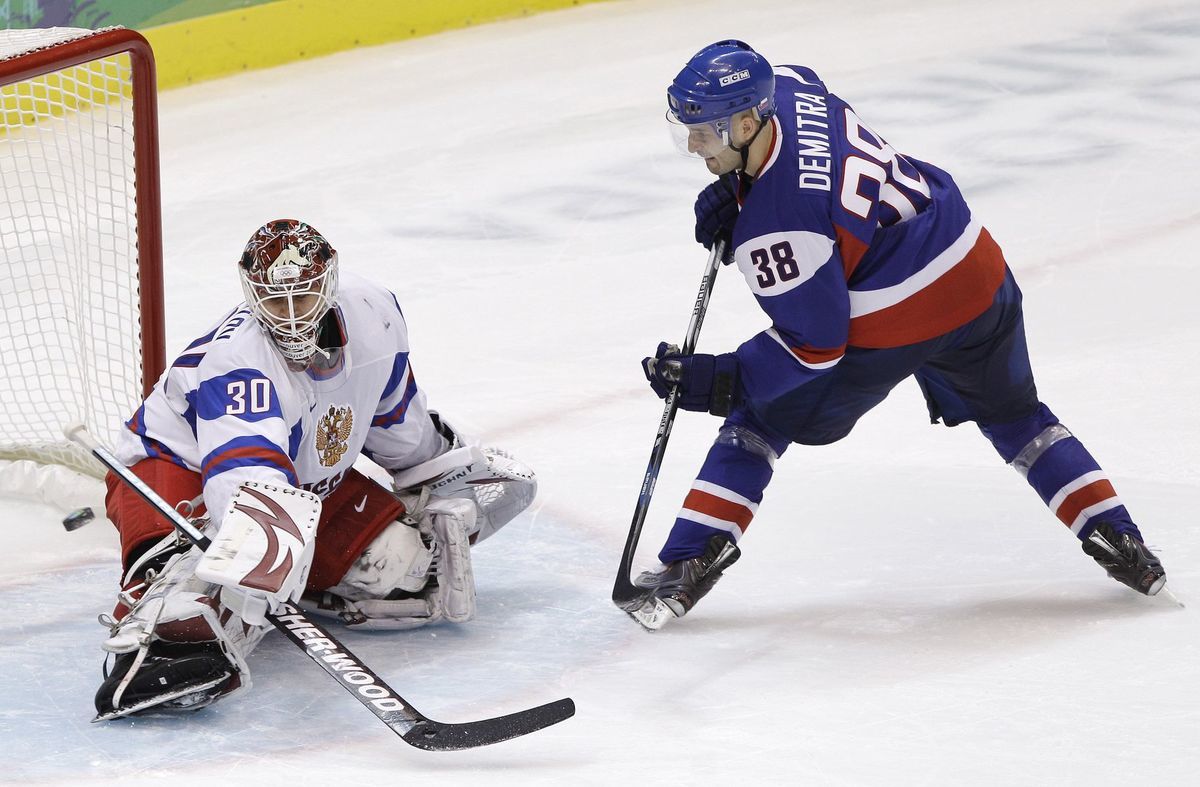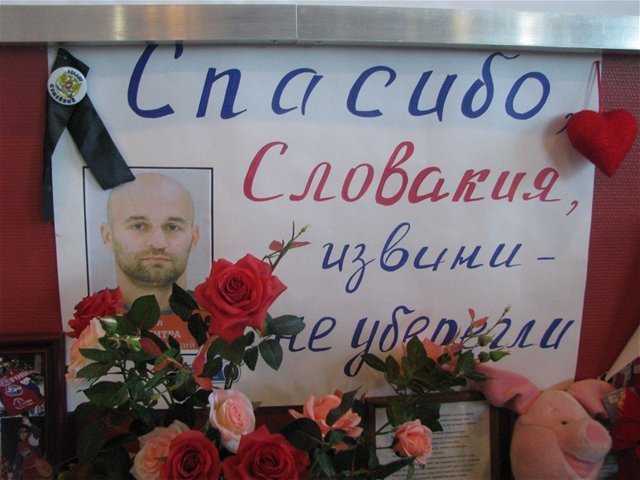This is probably how – exactly thirteen years ago – the Slovak public experienced a series of sad events.
One big tear filled her eye. The lump in the throat still remains. The leader, the captain, the darling of the stands has been looking down on the (non)hockey world for more than a decade.
“It is a terrible tragedy. I would like to erase this day from my life. To wake up in the morning as if he wasn’t there. I never expected that I could experience something like this in my life,” said Ľubomír Višňovský, who was born on the day of the tragedy.
“I will never forget his solo run that decided the game against the Russians at the Olympics. God, how he just bathed the goalkeeper there,” he added.
The winning type
The whole world knows that he had a talent from God. From Dubnica, where he grew up, through Trenčín, where he became a hockey star, to the most famous arenas across the sea.
Give him a puck and he’ll give him a thought. Unusual, hard to read. The kind that only hockey thinkers give out.
“And it hits him exactly to the millimeter. Wherever he wants,” this is how legendary goalkeeper Roberto Luongo remembers Demitr’s shots. It is said that most players use two or three favorite moves, the Slovak “38” had a whole palette of them. “It was impossible to prepare for him,” he admits.
Like most successful Slovaks in hockey, Demitr’s story began on the street. Among the block of flats.
“No one wanted to play against Paľ. That was a clear loss. He scored three, four, five goals, then his parents took him away, and when he saw from the balcony that the opponent equalized, he returned, scored two, three more and went home again. Simply a winning type,” his friends from the Dubnica housing estate smile in the documentary “38 – Film tribute to a hockey legend” when remembering Demitra.
Paul Demitra At the age of seventeen, he wore the jersey of Dukla Trenčín.
It’s true, the skillful hands were later noticed by hockey connoisseurs. Perhaps that’s why he already played in the third five of Trenčín as a sixteen-year-old. Charge Dukla! Everyone suspected that a future NHL star was growing under their hands in the winter there.
Lucky eye
He had a difficult start in the best league in the world. He was also sent to a farm in Ottawa. Well, you know, genius can only recognize genius. Peter Šťastný noticed him and immediately recommended him to St. Louis Blues.
“I basically discovered him. I convinced Mike Keenan to bring him. He was an amazing talent. He had nerves of iron, great foresight and vision. He always made the right decision,” Šťastný later admitted to the profile portal.
A great career began and the Slovak teletext pages glowed blue every morning: Demitra – goal! Demitra – assistance!
“They looked forward to each one together with Handzuš and Bartečko like little children,” recalls Šťastný. “He was one of the greatest playmakers in the world. He was able to speed up the game, serve a clean final pass. And a brilliant finish,” adds Handzuš.
One of the best hockey players ever born under the Tatras, he was a wonderful person. Friendly. Kind in every way.
In the 1998/99 season, he was promised a reward of half a million US dollars for 90 Canadian points. His teammate Scott Young 300 thousand for 25 accurate hits. Both were only one step away from being fulfilled.
In the last match, they rushed to an empty goal without a goalkeeper during the opponent’s game. And what did Demitra do? He chose a pass instead of a shot. Young didn’t hit and there was no one from two premiums. A year later, he won the Lady Byng Trophy for the most polite player in the league.
“One of my principles is not to hurt anyone – in life or on the ice,” he confessed to Pravda at the time.
A famous bluffer
He also liked to wear the Slovak national jersey. His 4:2 goal in the bronze medal game against the Czech Republic at the 2003 World Championship will remain memorable.
“Pało often talked about his roots. He was a very proud Slovak. He always wanted to be better than the Czechs,” noted Los Angeles Kings teammate Jeremy Roenick from a distance.
Demitra had a hard time enduring the failure at the Vancouver 2010 Olympics. With the national team’s badge on his chest, he led the team to fourth place after a heavy loss to Finland 3:5. He claimed that it would haunt him for the rest of his life.
 Photo: SITA/AP, Matt Slocum
Photo: SITA/AP, Matt Slocum
Pavol Demitra, Iľja Bryzgalov Unforgettable raid by Pavel Demitra against the Russian goalkeeper Iľj Bryzgalov.
A year later, at the home WC, he said goodbye to the jersey with the double cross on the chest. His thank you speech on the ice with tears in his eyes will remain a part of Slovak hockey history.
“I cried even after the Olympics, even now these are indescribable moments for me,” he said just after the last match.
Originally, he wanted to end his career, but his hockey heart still wanted to score goals. In Yaroslavl, he agreed on a one-year contract. He promised it was the last.
He did not have time to finish it – on September 7, 2011, he died in the wreckage of a plane on his way to a match.
“The saddest day in my life,” his great friend Marián Gáborík mourned even today. “You were a hockey god on the ice and you also went to hockey heaven. Watch over us there from the mountain and rest in peace. Your boys,” the bereaved said at a public farewell.
The leadership of the Slovak Ice Hockey Association removed the national team thirty-eight from circulation so that it would forever remain linked to Demitr. Goalkeeper Jaroslav Halák had Demitr’s winning gesture from the Winter Olympics in Vancouver 2010 painted on his helmet.
 Foto: Stanislav Benčat
Foto: Stanislav Benčat
Pavol Demitra, memory Thank you, Slovakia. I’m sorry we didn’t save him.
Marián Gáborík has a sticker with Demitra’s number on it, Tomáš Kopecký wore gloves with ‘RIP PD 38’ embroidery and saluted his friend to heaven after every goal…
The former NHL star is named after the hockey stadium in Trenčín and the primary school in Dubnice nad Váhom, where the hockey forward spent years of compulsory schooling.
At the announcement of the Golden Puck poll, they award the Pavel Demitra Award for the best player under the age of 20, the hockey virtuoso was inducted into the Slovak Hockey Hall of Fame in memoriam.
Demitr’s passion for the game and strong hockey spirit also inspired Slovak hockey players at the 2012 WC, where they won a sensational silver medal. At the medal ceremony, team captain Zdeno Chára wore a jersey with the number 38 and the name Demitra.
Thirteen years ago, the hockey elegant man with the soul of a gentleman left. However, Slovakia still feels him close to them.
“Sometimes we don’t even realize how fine the line is between life and death. How quickly and easily the most valuable thing can be lost. And how unspeakably difficult it is to cope with the loss of the closest person, full of strength and desires in their prime.
An empty seat at the table is a silent question mark over an unfathomable fate. And when the entire locker room remains empty and the hockey sticks become an alley of crosses on the last journey, it hurts immensely,” wrote Pravda editor Pavol Komár the day after the tragedy.
In memory of Pavel Demitra, a great hockey player and person.
The locomotive was buried by a captain with a fake license and an unprepared pilot
Vadim Timofejev, former deputy general director and head of crew training of the now defunct airline JAK Service, is responsible for the death of the Lokomotiv Yaroslavl ice hockey team aboard a JAK-42D plane that crashed on takeoff a year ago. Vladimir Markin, head of the investigative commission, announced the final verdict on Thursday.
“Timofeyev, in violation of the law, allowed the crew to drive the machine, although at the time of the crash they had nothing to look for behind the plane’s stick. Among other things, the captain of the machine, Alexander Solomencev, was flying the plane on the basis of a fake license signed by Timofeev. At the time of takeoff, co-pilot Igor Ževeľov had not yet finished retraining from the older type JAK-40 to JAK-42D,” RIA Novosti quotes the head of the tragedy’s investigators.
Nevertheless, the captain entrusted the co-pilot with starting the plane, which is a key maneuver in controlling the machine. Instead of a training flight, Solomencev did so during a flight with passengers, because he needed to prepare a replacement for himself as soon as possible. He himself was preparing to manage Boeing. As it turned out, the co-pilot was retrained only on paper.
“At the same time, the fundamental difference between the two modifications of JAK lies precisely in the start. While in the older type of aircraft the pilot has to pull the stick towards him and press the pedals at the same time when taking off, in the newer version the use of the legs in this part of piloting is prohibited. It explains why the pilot applied the brakes during takeoff,” Komsomolskaya Pravda reported. In addition, the previous investigation confirmed that traces of phenobarbital were found in Ževeľ’s blood, which helped him with leg problems. Among other things, the mentioned preparation numbs the nervous system.
During the investigation of the tragedy, they interviewed more than 200 witnesses and conducted more than 120 expert examinations. The investigation file has 90 parts. The tragedy in Yaroslavl happened on September 7, 2.5 kilometers from the Tunošna airport during a flight to Minsk. The Lokomotiv hockey team, which was on board, was supposed to play the first game of the new year of the Kontinental Hockey League.
There were 45 people on board – 8 crew members and 37 passengers. Initially, two people survived the tragedy – hockey player Alexandr Galimov and on-board mechanic Alexandr Sizov. However, the athlete succumbed to severe burns after five days, and the crew member survived, but still suffers from serious mental disorders.
Source: sportweb.pravda.sk


